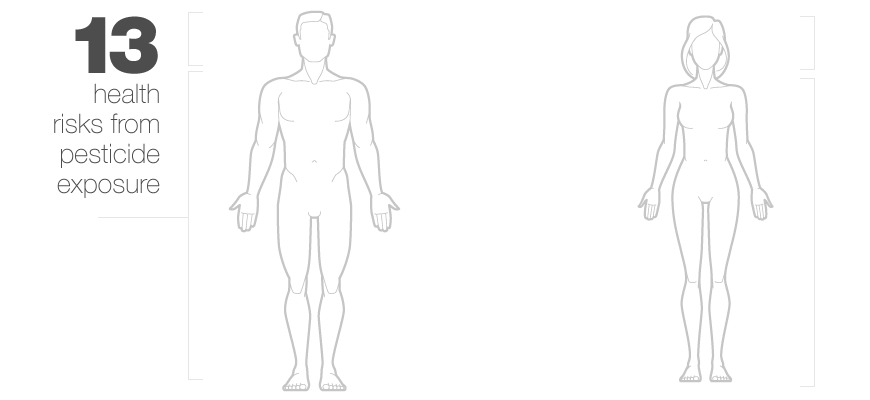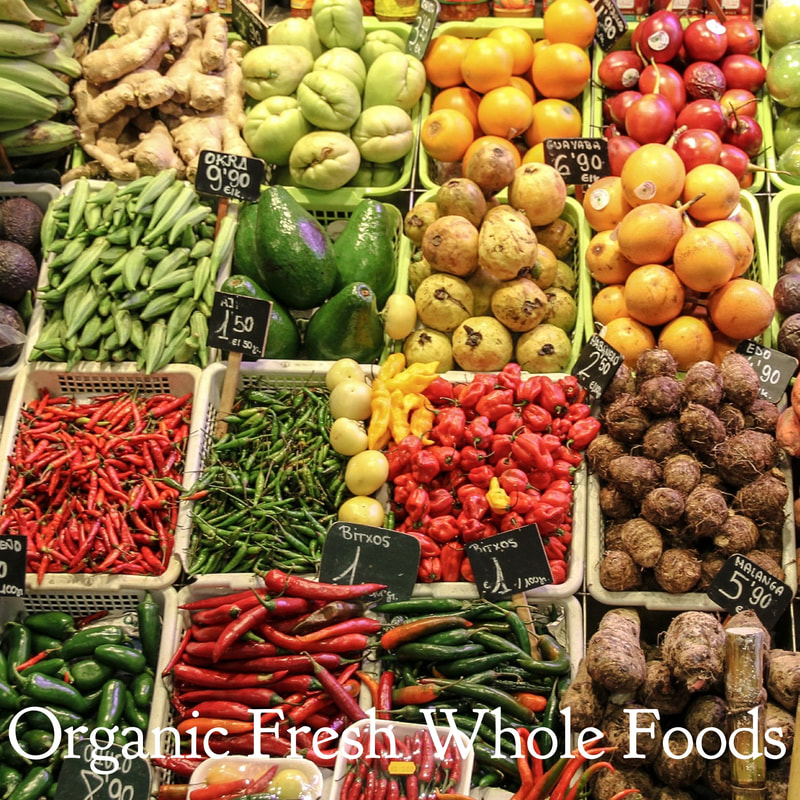|
Do you sometimes wander the supermarket aisles wondering what's healthy and what's not? It seems every day there is some new product claiming to be the latest health product or superfood. One thing that continues to be on shopper's minds are the issues with pesticides in fruits and vegetables. In a 2015 Consumer Reports survey of 1,050 people found that pesticides are a concern for 85 percent of Americans. Many experts and consumers believe that organic is always the best choice for your health, the environment, and the farmer's who grow our food and who are exposed to the toxic pesticides. There are definite risks depending on the type of produce and where it is grown.  According to EWG’s analysis of test data from the Department of Agriculture for our 2019 Shopper’s Guide to Pesticides in Produce,™ nearly 70 percent of the produce sold in the U.S. comes with pesticide residues. Overall, the USDA found 225 different pesticides and pesticide breakdown products on popular fruits and vegetables Americans eat every day. Research shows that residues of these chemicals remain on the fruit and vegetables even after washing them. The chemicals then make their way inside our bodies. Toxins from pesticides can remain in the body and build up in the liver and fatty tissue. These toxic chemicals have been linked to cancers, brain disorders, fertility and other medical issues. Researchers have found convincing evidence that chemicals in the environment could be contributing to many issues. One particular issue of concern is the obesity epidemic. Chemical “obesogens”- dietary, pharmaceutical, and industrial compounds - may alter human metabolic processes and predispose some people to gain weight. Farmworkers and their families have the greatest risk. Data comes from studies farmworkers who work with the chemicals regularly. Children are at greatest risk from pesticide exposure because their metabolism is different from an adults. Toxins remain longer in a child’s body and the risk is concentrated because they eat more food relative to their body weight than an adults. Pesticide exposure can affect children’s development at many stages, starting in the womb and the health risks are significant. Even small amounts of pesticides may alter a child’s brain chemistry during critical stages of development. "A study of 8- to 15-year-olds found that those with the highest urinary levels of a marker for exposure to a particularly toxic class of pesticides called organophosphates (OPs) had twice the odds of developing ADHD as those with undetectable levels. Another study found that at age 7, children of California farmworkers born to mothers with the highest levels of OPs in their bodies while they were pregnant had an average IQ 7 points below those whose moms had the lowest levels during pregnancy. That’s comparable to the IQ losses children suffer due to low-level lead exposure." The risk to adults may be lower but is still problematic due. “Pesticide exposure likely increases the risk, first, of cancerous tumor development, and, second, your body not being able to control a tumor growth,” says Charles Benbrook, Ph.D., a research professor at the Center for Sustaining Agriculture and Natural Resources at Washington State University and a consultant to Consumer Reports. In addition, research has linked endocrine disrupters with fertility issues, immune system damage, and neurological problems. “However, unlike cancer, quantifying those effects is difficult at this time,” Crupain says. Research shows those with the highest frequency of organic food consumption had 25 percent fewer cancers than individuals who did not eat organic food. There is value in eating organic food... So how do we eat organic food when the costs seem prohibitive? Great question! There are some things you can do! Along with The EWG analyses USDA figures every year to come up with their famous Dirty Dozen and Clean Fifteen lists of produce that ranks most and least amount of residue. The EWG's 2019 Dirty Dozen will tell you which fruits and vegetables are most important to buy organic by ranking the fruits and vegetables that are most contaminated with pesticide residues. Also listed is the EWG’s Clean Fifteen list of fruits and vegetables. The EWG also ranks their full list of 47 fruits and vegetables from most to least amount of pesticides. If you would like to use this list most effectively and eat any of the fruits and veggies on the list, I suggest buying organic from the top 20; focus on buying the bottom rest in your food plan if you can't find organic or budget it to your weekly plan. This will give you the least amount of pesticides. NOTE: Local is a term that is broadly defined. Organic, on the other hand, is a strictly regulated term, so you can trust that you're getting produce grown with minimal if any synthetic pesticides. Eat a whole food diet. While eating organic may not seem to be as easy as you think on your budget, there are some things you can do. Eating a whole food diet predominantly of fruits and vegetables is the critical and very important first step to eating healthy. This is priority over a processed foods diet. The first step is to cut out empty foods that add no nutritional value and spike your insulin (blood sugar levels) leaving you hungry an hour after you eat. These high glycemic carbs (pastas, white bread, enriched packaged noodles, crackers, chips), sodas, candy, ice cream, and non-nutritional value added foods cause you to eat more due to an insulin surge to your body. There only value (which is of no value) is weight gain and higher grocery bills due to increased hunger from a lack of satiation and nutrition. A more cost-effective, healthier option is to add foods and beverages in their whole form instead. Eat the whole apple rather than processed applesauce. Eat a whole chicken breast rather than a processed chicken nugget. Eat the whole orange rather than drinking a glass of orange juice (equivalent to several oranges and awarding an insulin surge that follows with a serious crash). Skipping conventional produce is not necessary. While organic is always the best choice, striving for a diet rich in fruits and vegetables - ideally five more more servings per day - is the goal and always priority over processed foods. Purchase whole foods to stretch your organic dollar. Buy whole carrots (not the packaged baby carrots) and cut up at home. Buy a whole head of lettuce vs. a box or bag of pre-washed lettuce. You will need to clean and prepare at home, but will get and save more. Purchase in season and when prices are lower and in abundance; stock up on the produce in the summer and fall and freeze or can for storage. Support your local farmers market or join an organic CSA (community supported agriculture). This is an opportunity for you to receive the weekly harvest at reduced cost from purchasing at the store. Purchase locally grown produce at your local grocery store. Learn to read food labels. If there is something on the label that you don't recognize, can't pronounce, or make in your kitchen at home, don't put it in your grocery cart. Eat whole food that has ingredients without labels our with minimal ingredients that your body will know how to easily digest. Be grateful for your beautiful body. Treat it well and it will be kind to you back. Feed it good quality healthy foods, move daily, provide time for mindfulness and meditation. Add in any one of the ideas mentioned above as you are able. Finally, ask yourself the question: how would you like to see your hard-earned money spent? Would I like to see my money spent on the small added investment in my family’s preventative healthcare through healthy whole food/organic food choices? Or will I ultimately spend it in lost wages due to sick leave and the high cost of health care? The choice is yours. If you need help in getting started, feel free to Contact Me. The initial consultation is FREE. I would be happy to discuss how to incorporate some healthy diet and lifestyle changes into your plan. References:
https://www.ewg.org/foodnews/summary.php https://www.ncbi.nlm.nih.gov/pmc/articles/PMC3279464/ https://www.consumerreports.org/cro/health/natural-health/pesticides/index.htmttps://www.ewg.org/foodnews/full-list.php https://www.consumerreports.org/cro/health/natural-health/pesticides/index.htm https://www.globalhealingcenter.com/natural-health/effects-of-pesticides/#references https://www.ncbi.nlm.nih.gov/pmc/articles/PMC3108117/
0 Comments
Your comment will be posted after it is approved.
Leave a Reply. |
Categories
All
�
Archives
November 2022
|


 RSS Feed
RSS Feed